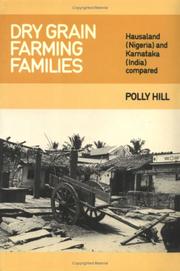| Listing 1 - 2 of 2 |
Sort by
|
Book
ISBN: 144385848X 9781443858489 1443801259 9781443801256 Year: 2016 Publisher: Newcastle upon Tyne, UK
Abstract | Keywords | Export | Availability | Bookmark
 Loading...
Loading...Choose an application
- Reference Manager
- EndNote
- RefWorks (Direct export to RefWorks)

ISBN: 0521271029 0521233704 1139165801 9780521271028 9781139165808 9780521233705 Year: 1982 Publisher: Cambridge : Cambridge University Press,
Abstract | Keywords | Export | Availability | Bookmark
 Loading...
Loading...Choose an application
- Reference Manager
- EndNote
- RefWorks (Direct export to RefWorks)
Anthropologists and economists have made persistent efforts to identify economic features of rural tropical economies in the simplest possible terms, in order to enhance their universality. This has resulted in the creation of doctrine on such matters as the causes of rural economic inequality and abysmal poverty. The doctrine is far too generalised to have any practical utility; it is ahistorical; and it usually involves the false belief that all cultivators in a community have similar economic responses. So firm is this orthodoxy that under-development studies have become deadlocked - to the point that our ignorance is constantly on the increase. The book represents a radical assault on prevailing orthodoxy, breaking the deadlock by insisting that we properly categorise the main types of agrarian system in the tropical world. Moreover, it practically demonstrates how to identify these important categories, and draw useful generalised conclusions about it, on the basis of detailed fieldwork in parts of northern Nigeria and south India.
Economic geography --- Agronomy --- Third World: economic development problems --- Nigeria --- India --- Agriculture --- Economic aspects --- Karnataka (India) --- Nigeria, Northern --- Rural conditions --- Developing countries: economic development problems --- Social Sciences --- Anthropology --- Agriculture - Economic aspects - India - Karnataka --- Agriculture - Economic aspects - Nigeria, Northern --- Karnataka (India) - Rural conditions --- Nigeria, Northern - Rural conditions --- Rural conditions. --- Farming --- Husbandry --- Industrial arts --- Life sciences --- Food supply --- Land use, Rural --- Northern Nigeria (Region) --- Карнатака (India) --- Estat de Karnataka (India) --- Καρνάτακα (India) --- Karnatako (India) --- קרנאטקה (India) --- Ḳarnaṭaḳah (India) --- Carnatica (India) --- Карнотако (India) --- Karnotako (India) --- Mysore (India : State)
| Listing 1 - 2 of 2 |
Sort by
|

 Search
Search Feedback
Feedback About UniCat
About UniCat  Help
Help News
News